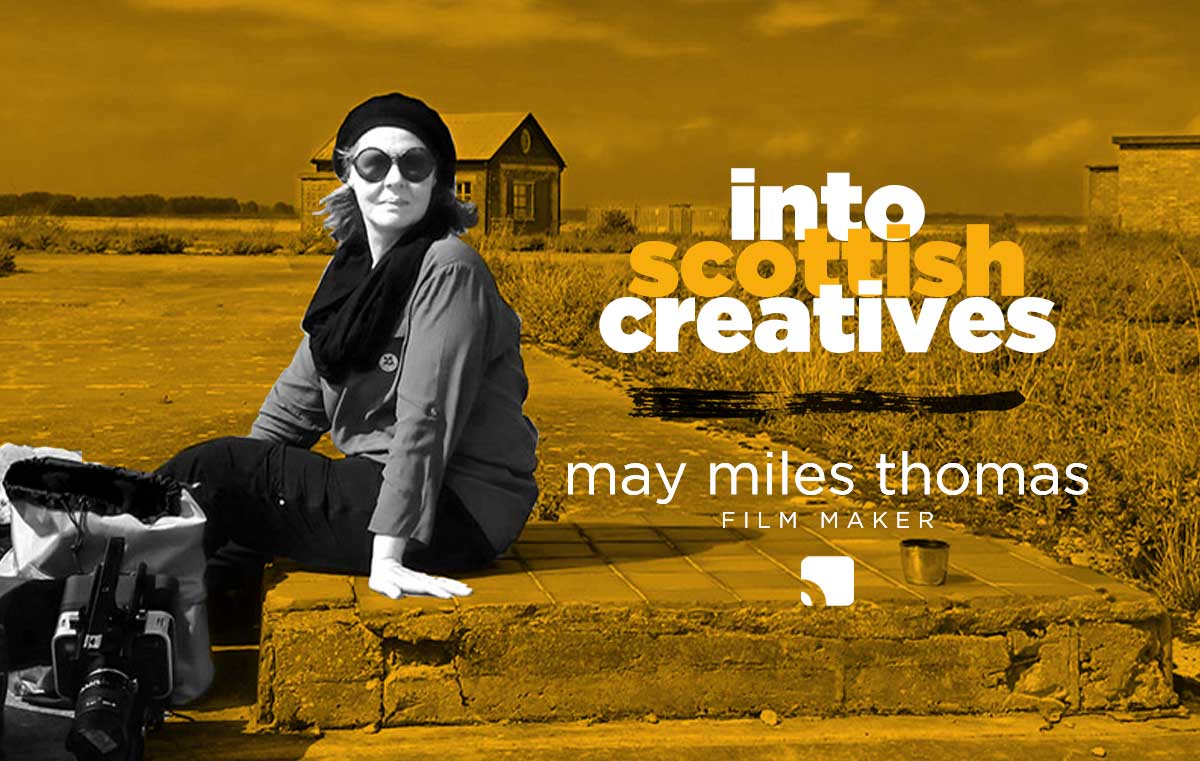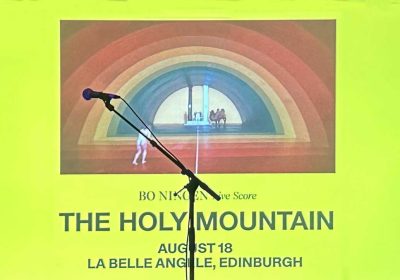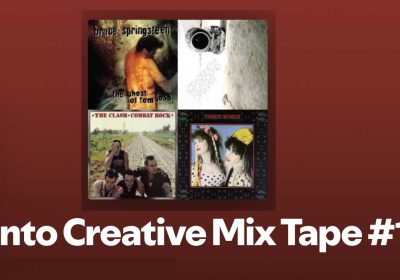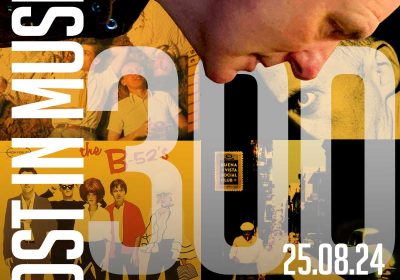Into Scottish Creatives: May Miles Thomas

Glasgow-born film maker May Miles Thomas is undoubtedly one of Scotland’s finest visual storytellers, an award winning auteur whose tapestries challenge and bewitch in equal measure. Yet remarkably, she remains relatively unheralded in her homeland. May Miles Thomas is someone who sees the story between the cracks, beneath the dust and we were delighted to have the opportunity to bend her ear as part of our Into Scottish Creatives series.
Covid and the lockdown. How has it been for you and yours, May?
The lockdown’s affected everyone but, so far, I’m coping well. Normally I work from home but last year I had an accident which left me immobile and bed bound for five months. It was as good a preparation for lockdown as it gets. My husband’s a key worker so he’s usually out of the house which was a worry, initially, but I’m proud he’s doing something positive for others.
In 2018, you wrote and directed a magnificent piece of work, and my film of the year; the award-winning feature, ‘Voyageuse’. This personal journey through the hitherto unknown life of your own late mother-in-law was a real tour de force, skilfully taking the viewer around a still, spectral present while simultaneously luring us into an almost conspiratorial web of intrigue set decades previously.
Firstly, can you tell me what inspired you to tackle this project and secondly, what were the challenges you faced making the film and what help (if any) did you receive from Scotland’s creative sector?
Thank you so much. People often say ‘it means a lot’ when someone praises their work but it really does matter to me. I work entirely on my own with no funding or other industry or institutional support so every film is a kind of miracle. Voyageuse was on the back burner for years. It sounds unpromising – it’s the story of my late mother-in-law, Erica Thomas – but it turned out to be more intriguing than I first thought and it really made me think about the dynamic within families.
The film was inspired, in part, by a trio of deaths that occurred within the space of a year; my mother, Vera, my husband’s grandmother and Erica. I was particularly moved by Erica’s funeral because only four of us attended. Sitting in an almost empty crematorium I thought, who will remember this woman? Despite all her privileges and remarkable life, for decades Erica was afflicted by severe depression and loneliness so I was determined to give her story a better ending.
Years before, in 1997 I visited Vera who was then in the early stages of dementia. In her Croydon home I discovered a metal box full of cans of 16mm film reels so I asked the BFI Archive to look at them. They turned out to be family films dating from 1929 to 1953, shot all over the world. The BFI offered to restore them so the archive became the basis of the film. It’s amazing to think how these days everyone’s lives are recorded but in 1929 it was rare for a family to shoot their own films. Vera also shot thousands of photos, some of which I restored and used in the film.
Originally Voyageuse was intended as a conventional drama but in my heart I knew it didn’t work so I abandoned the project. Around that time I made a film, The Devil’s Plantation and the way it was made became a prototype that freed me up from the standard method of working to an intense schedule of pre-production, shoot and post. How I work now is more contemplative and less pressured. Ideas grow and develop organically, resulting in work that – for me, at least – has more depth and resonance.
In 2014 I decided to take a different approach. I researched every aspect of Erica’s life to get at the truth of who she was rather than invent a drama that never existed – the kind of narrative fakery I’d be forced into if it were a ‘straight’ film. Immediately I knew it would work. For the first and only time I applied to Creative Scotland for funding but was rejected so I decided to make the film using only what was within my gift; basic equipment and the storytelling and technical skills I’ve acquired over the years. To cover hard costs I sold some kit and used my savings. Since the production was spread over three or so years the spend wasn’t ridiculous.
On reflection, having no third-party funds freed me to make what I wanted and that was worth more than money. The finished film is quite affecting and I’m truly gratified at the audience and industry response – it really seemed to touch people. My only regret is that despite my efforts I can’t get it in front of an audience.
You’ve spoken in the past about seeing the movie ‘Funny Girl’ with your Grandmother and the impact it had on you as a child. What was it about cinema, and that experience in particular, that set you on a journey from junior Streisand fan to a career in the film industry?
Growing up, my greatest escape was always the movies – as it still is for many people. I would go to the local picture houses once or twice a week with my siblings, with my teenage uncle acting as babysitter while my mother worked as a hairdresser. For the tentpole movies, musicals such as The Sound of Music, Sweet Charity or Funny Girl I would usually go with my paternal grandmother, Lizzie, a ferocious woman who dressed immaculately in ocelot, astrakhan and velvet, dripping with costume jewellery. She also liked a good drink and sang bawdy songs – like a larger than life character out of a movie – in fact, she often compared herself to Mae West.
No one in my family had ever entered higher education but at 17 I got into the Glasgow School of Art and graduated with honours four years later. After drifting from job to job, I landed a temporary position at BBC Television in London in the scenic design department for which I gave up everything – which wasn’t much. Four months on I was offered a permanent staff job which I jumped at, having nothing to return to in Glasgow. Through a set of strange coincidences I parlayed my role as assistant designer into a directing gig. At the time I learned I was one of only four people to make the impossible leap from scenic design to directing at the BBC; one of the four was Ridley Scott.
Nothing about my career was planned. In film and TV, no two writers/directors ever take the same path. It helped that I could write – I began writing from a young age – preschool, in fact – though I didn’t have much confidence in my early efforts. It was a fairly typical working class experience, I think, that ‘not getting above yourself’ mindset inherited from my parents which eventually alienated me from my family. At art school I was into photography then in film and early video. Television was a great education when dealing with both the political and technical aspects of production so by the time I quit the BBC to go freelance I had acquired a lot of experience though I still struggled with imposter syndrome.
My greatest, most constant love is cinema. For me nothing compares with the shared experience of sitting in a dark room watching a story unfold. It’s ineffable and very powerful.
The BFI called you one of the most prolific filmmakers in the UK yet even after delivering ‘Voyageuse’ on a micro-budget, why has adequate funding for new projects, even from established and notable filmmakers like yourself, become increasingly hard to secure? Has age/location/gender been an issue?
The truth is they didn’t – well, not without a fight. There’s an irony surrounding the whole affair with the British Film Institute that’s worth recounting. In September 2017 they launched a Filmography claiming it was a ‘complete catalogue’ of British feature film. The filmmaker and ex-BBC TV colleague of mine, Mark Cousins tweeted how my work wasn’t listed even though I’ve made several award-winning features. So began a year-long battle for my films to be included which the BFI resisted at every turn. Their implication was I wasn’t a ‘legitimate’ filmmaker because my work didn’t fit their criteria. Thinking of the many hundreds of people who’ve worked with me and who were denied their rightful credit, I took my case to their Chief Executive who only passed it back down the chain and still no one would budge.
Then in December 2018 Voyageuse won the Discovery Award at the BIFAs. It was also chosen by the Guardian’s chief film critic, Peter Bradshaw as one of his top films of that year. The day after the BIFA ceremony I met the BFI Archive staff who realised they couldn’t keep excluding me – it was getting embarrassing – so finally they agreed to list my work in the Filmography, placing me in the top 10 most prolific UK female directors, so it was a feelgood ending. As a coda, I find it ironic that in his epic series on female filmmaking, Women Make Film, I’m not mentioned by Mark Cousins.
On the subject of funding I’ve pretty much abandoned the idea of getting paid. I’m fortunate because my husband supports what I do so the bills get paid. People don’t want to hear this but no one’s entitled to make films, be they commercial or culturally driven. I love what I do because it’s experiential, not because I’m chasing after the trappings. Living in Scotland and given the dearth of indigenous production it’s a struggle to get anything made so I make my own luck.
To date I’ve had no dealings with Screen Scotland because I don’t fit their criteria for funding but my impression is they want to attract large-scale incoming film and TV productions rather than support homegrown talent. Of course I’d love the luxury of a budget to make more ambitious films but for now I’m content working to the model I’ve devised because it gives me creative freedom, a luxury in itself.
As you touched on earlier, you recently suffered a serious injury which required intensive hospital treatment and a lengthy recuperation period. How much has the enforced lay off affected your plans and in which ways have you been able to adapt in order to continue to create?
Last year I had a serious accident – a freak fall – where my leg split in two and all my ligaments were broken. This resulted in a long hospital stay, two operations and five months in bed. I’m still on frequent pain meds and a daily physio routine. Thankfully I’m mobile now but I’m looking at a long recovery. As a consequence I’ve been forced to take time out to reflect on what I’m doing and why.
Before my fall – and the lockdown – I had started work on a new film, Tilo IRL, an urban fairytale based on the Brothers Grimm stories. Without giving away too much, the film deals with young male depression, late capitalism and environmental disaster, which may not sound like a bag of laughs but my take is highly original and not too worthy – I hope. It’s set in a generic if dystopian city which makes Glasgow the perfect location.
The way I work these days, I no longer shoot to a prescribed schedule in one block, say six or eight weeks. Last year I shot a few sequences which I edited to get a sense of the tone. I know a few filmmakers and screenwriters who feel their current projects are redundant due to Covid-19 but Tilo feels very prescient. Meanwhile I’m testing out things, working on sound design and teaching myself new post-production techniques. Like most people under lockdown I’d be lying if I said I didn’t have bad days. It’s been hard trying to reduce the amount of opioids I’m on but what keeps me going is sitting in my edit suite at home and the excitement I feel when I know something works. That, and being out on a shoot because something interesting/crazy/surprising always happens. I wouldn’t swap it for anything.
George Paterson
@gfpaterson
…………………………
If you want to find out more about May’s impressive canon of work, including her award winning 2018 feature, ‘Voyageuse’, you can find her here…




Leave a Reply
You must be logged in to post a comment.